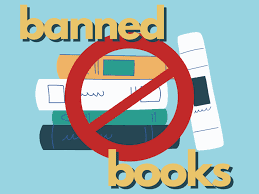Should we ban books? It's DebateAble.

Did you know that the first book was banned in the United States in 1637? That year, Thomas Morton published what the Puritan government considered a severe and heretical critique of Puritan practices in his book New English Canaan. Called “an infamous and scurrilous book,” it was subsequently banned throughout Quincy, Massachusetts. Book bannings are still with us, of course, and in the past two years more books have been banned or challenged than at any other time in our history.
This past fall, DebateAble students were able to interrogate whether banning books does more harm than good. Surprisingly to some, students discovered the diverse reasons that people advocate the banning of books. Books are banned and challenged because of discussing controversial or biased content as much as they are being banned for being too progressive. Debaters were able to interrogate motivations for banning books that come from both sides of the aisle to weigh their validity and do cost-benefit analyses. They then were able to develop their own opinions, after discussing in-depth the perspectives of both sides.
DebateAble values a debate education that can increase students’ ability to listen to arguments and consider them from multiple different standpoints to develop empathy and understanding. Our emphasis on evidence-based argumentation and thorough reasoning empowers our students to listen, think, and advocate for their own opinions in a respectful, nuanced manner. We are confident that young people who cultivate these skills will grow up to change the world for the better! We are honored to be a partner in that work.
Start cultivating critical thinking and empathy in your student today by signing them up for one of our summer session camps!
Categories
- News (4)
- Empathy (3)
- Teachers, Schools, Districts (7)
- Parents & Homeschool (9)
- After-School Youth Organizations (5)
- Seattle Area Schools Debate Clubs (2)
- Civil Discourse (6)
- At-Home Curriculum (8)
- Online elementary education (6)
- Virtual Classes (4)
- Virtual Teaching (1)
- Online Teaching (3)
- DebateAble Table Newsletter Series (7)

0 comments
Leave a comment
Please log in or register to post a comment